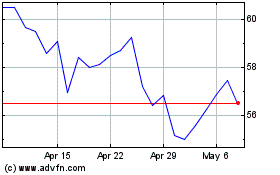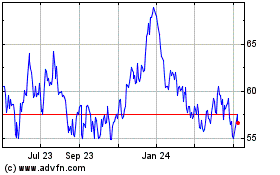Companies Pressed to Disclose More Climate-Change Risk
June 29 2017 - 2:29AM
Dow Jones News
By Sarah Kent
LONDON -- A panel of large financial institutions and companies
has launched a set of voluntary guidelines for more disclosure
about the impact of climate change, demonstrating rising concern
about potential investment risks posed by global warming.
The task force commissioned by a group of global regulators
known as the Financial Stability Board and led by former New York
City Mayor Michael Bloomberg said companies should disclose in
financial filings how they are planning for risks and opportunities
related to climate change. It also called for companies to develop
specific metrics and targets that could be used to measure
performance.
Climate-change risks have become an increasingly mainstream
concern for financial institutions and big companies, which see
both a real menace from global warming and a regulatory threat from
governments seeking to lessen its impact. The task force included
executives from J.P. Morgan Chase & Co., mining giant BHP
Billiton Ltd., and other large companies.
The recommendations have support from over 100 firms with market
capitalizations totaling more than GBP3.3 trillion and financial
firms responsible for more than $24 trillion worth of assets, the
task force said. The report will be presented to the G-20 in
July.
The recommendations' "widespread adoption will ensure that the
effects of climate change become routinely considered in business
and investment decisions," said Mark Carney, the Bank of England
governor and chairman of the Financial Stability Board.
Not everyone has welcomed the panel's work. A recent report by
IHS Markit funded by oil companies including BP PLC, Chevron Corp.
and Total SA warned that recommendations contained in an earlier
draft of the task force's report "could obscure material
information and create a false sense of certainty around the
financial implications of climate-related risks."
The task force's report, which took over a year to compile,
extends its recommendations for more disclosure to all public
companies. But the panel singled out the energy industry as one of
four sectors most at risk from climate change that should consider
providing more information to investors.
Last month, Exxon Mobil Corp. faced a revolt when 62% of its
investors voted in favor of a resolution calling for more
information about how climate change and regulations could affect
it, despite management objections. Exxon declined to comment. Chief
Executive Darren Woods previously said the company would "step back
and reflect" on how it could better express its position.
Faced with a similar vote, Chevron published a report on its
approach to managing climate risks in March. The company said it
uses a similar framework to the one recommended by Mr. Bloomberg's
task force.
"We believe Chevron's risk management and planning processes are
effectively managing the current risk exposure to the Company," a
spokeswoman said. "The current risk from climate change regulation,
even in a restricted greenhouse gas scenario, is minimal and
manageable over time."
A major criticism from investors is that many big operators are
making claims similar to Chevron's: that their assets and strategic
capabilities will allow them to win out in even the most severe of
climate-change scenarios. The fact that most say they will be among
the last oil-and-gas companies standing has prompted calls for
greater transparency and more standardized reporting.
In Europe, some big oil companies have embraced demands for more
climate disclosure. Royal Dutch Shell PLC and BP PLC both endorsed
proposals asking for more disclosure on climate change risk in
2015.
Shell welcomed the task force's report but warned that detailed
disclosure of forward-looking and potentially commercially
sensitive information within official financial filings could be
difficult.
"Companies should be clear about how they plan to be resilient
in the face of climate change and energy transition," said Shell
Chief Ben van Beurden.
In the U.S., shareholder support for more disclosure from
oil-and-gas companies revealed in recent weeks is largely
nonbinding.
The calls for more disclosure and transparency come even as the
Trump administration says it is pulling the U.S. from the Paris
climate accord, citing the need to boost the nation's industry and
independence.
"This was done by industry for industry, and there are
compelling reasons for companies to begin this journey," said Mary
Schapiro, a former Securities and Exchange Commissioner chairman
who is advising Mr. Bloomberg. "In the U.S. I have no expectation
that there will be a regulatory framework around these
recommendations."
The pressure from some regulators has begun to mount. The Bank
of England said earlier this month that it will probe the U.K.
banking sector's exposure to climate change. Others, including
Dutch, Swedish and German authorities have also been examining the
financial risks presented by the environment.
--Bradley Olson in Houston contributed to this article.
Write to Sarah Kent at sarah.kent@wsj.com
(END) Dow Jones Newswires
June 29, 2017 02:14 ET (06:14 GMT)
Copyright (c) 2017 Dow Jones & Company, Inc.
BHP (NYSE:BHP)
Historical Stock Chart
From Mar 2024 to Apr 2024

BHP (NYSE:BHP)
Historical Stock Chart
From Apr 2023 to Apr 2024
